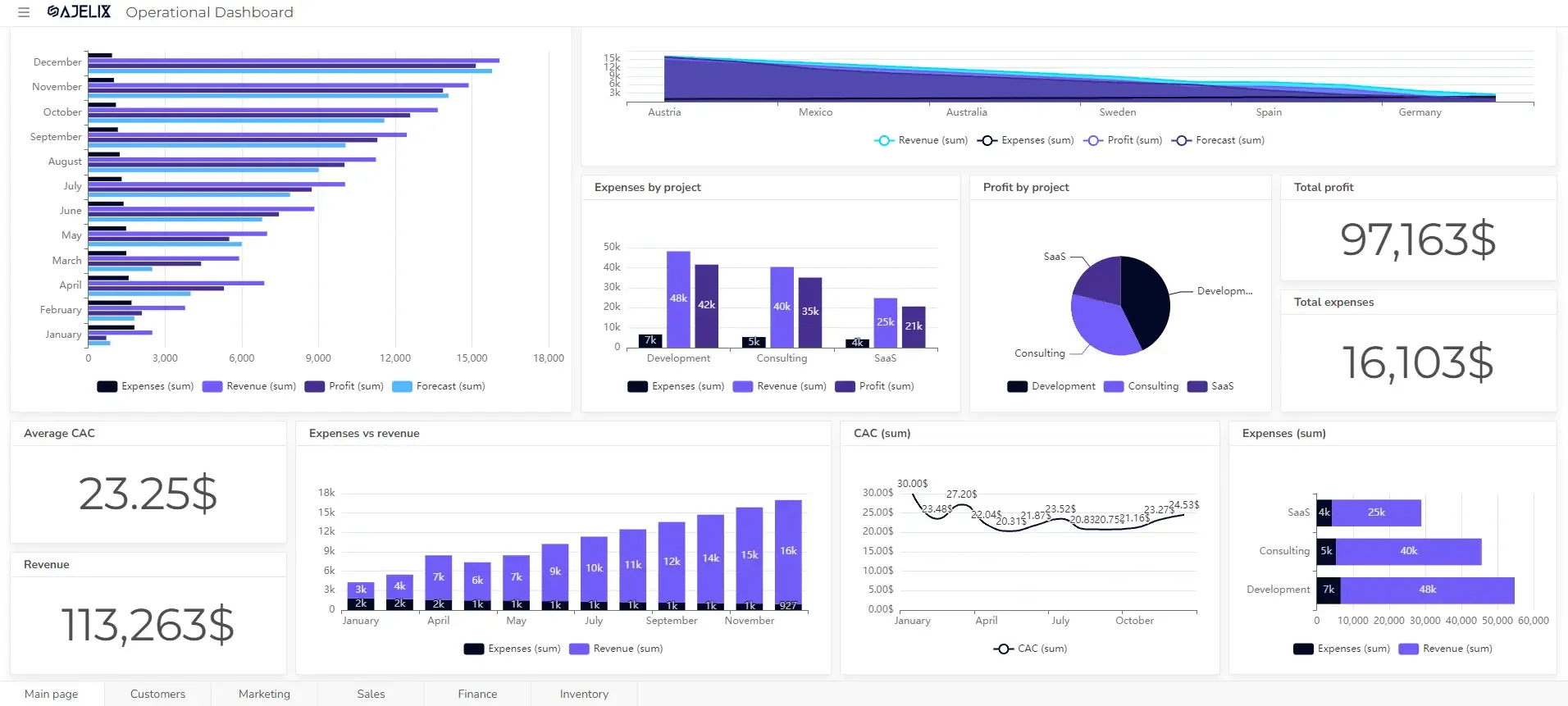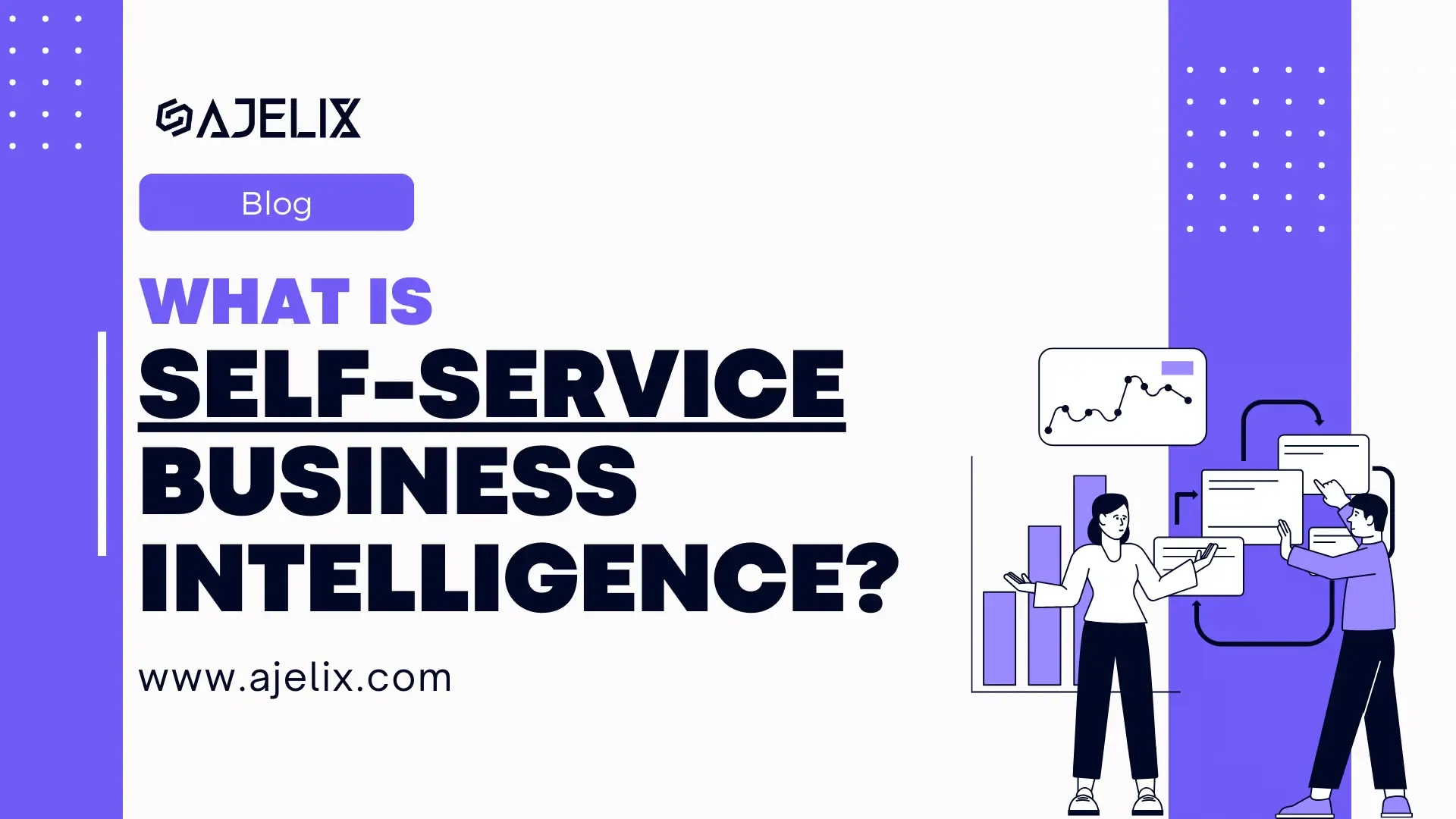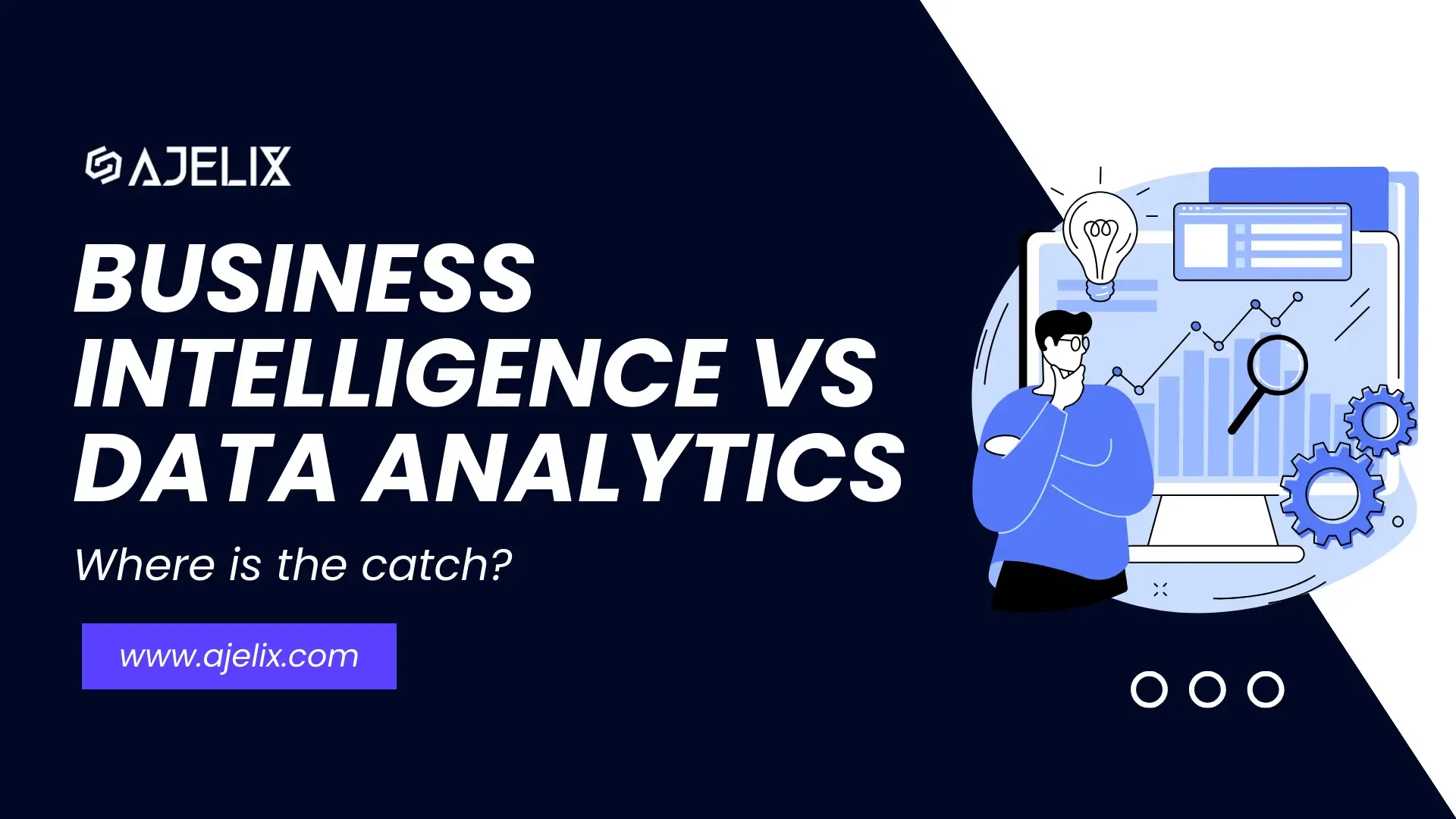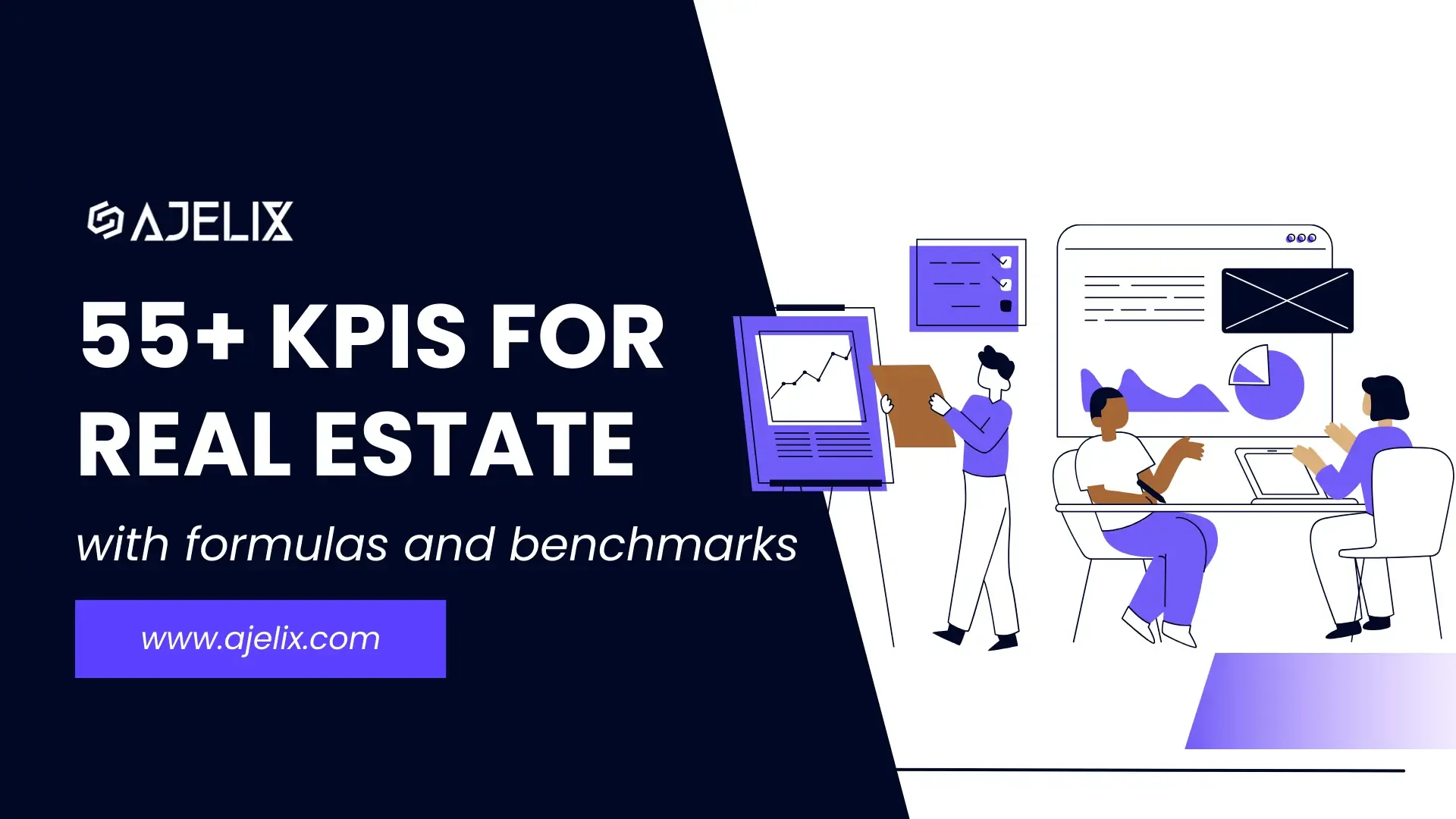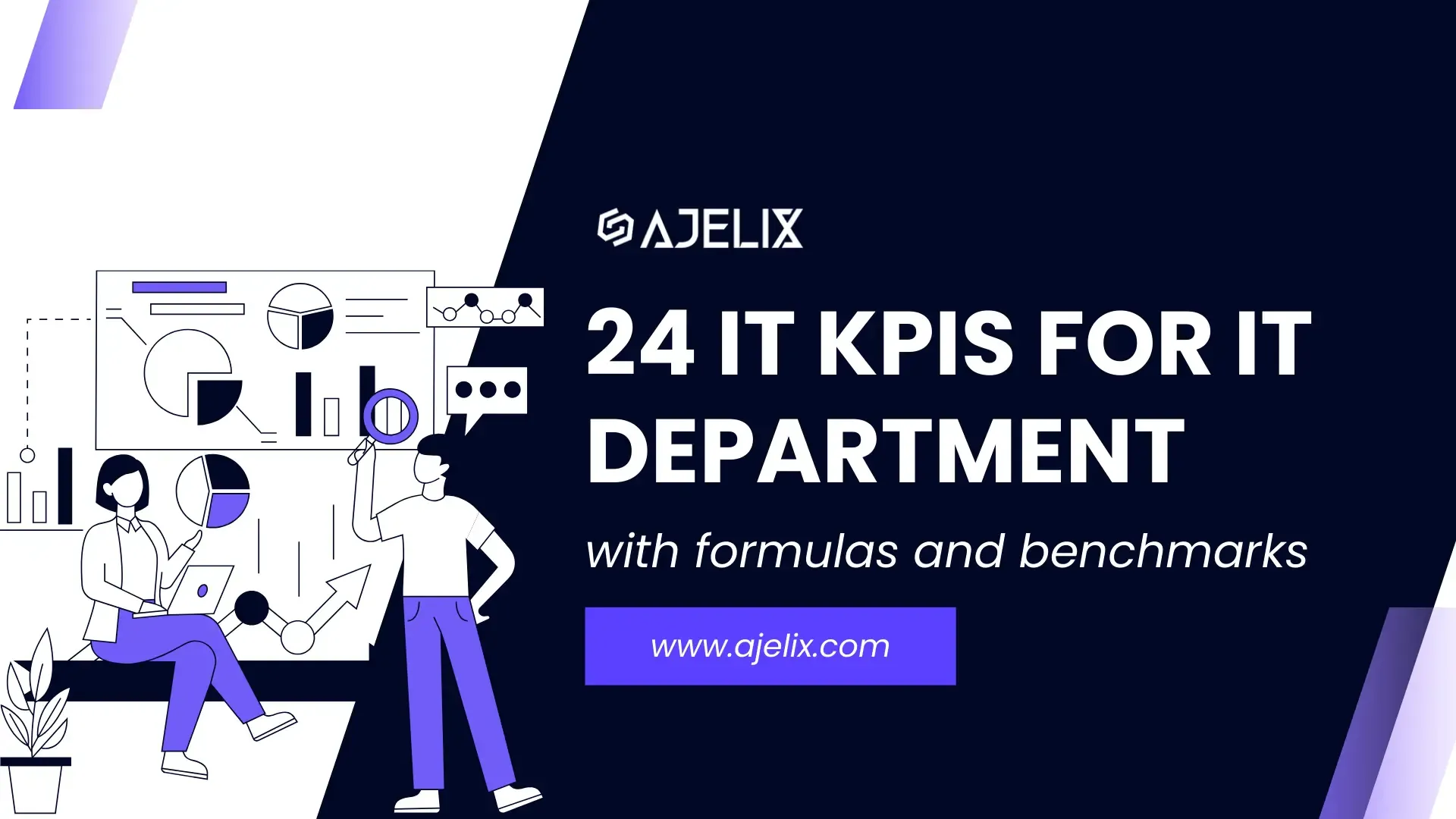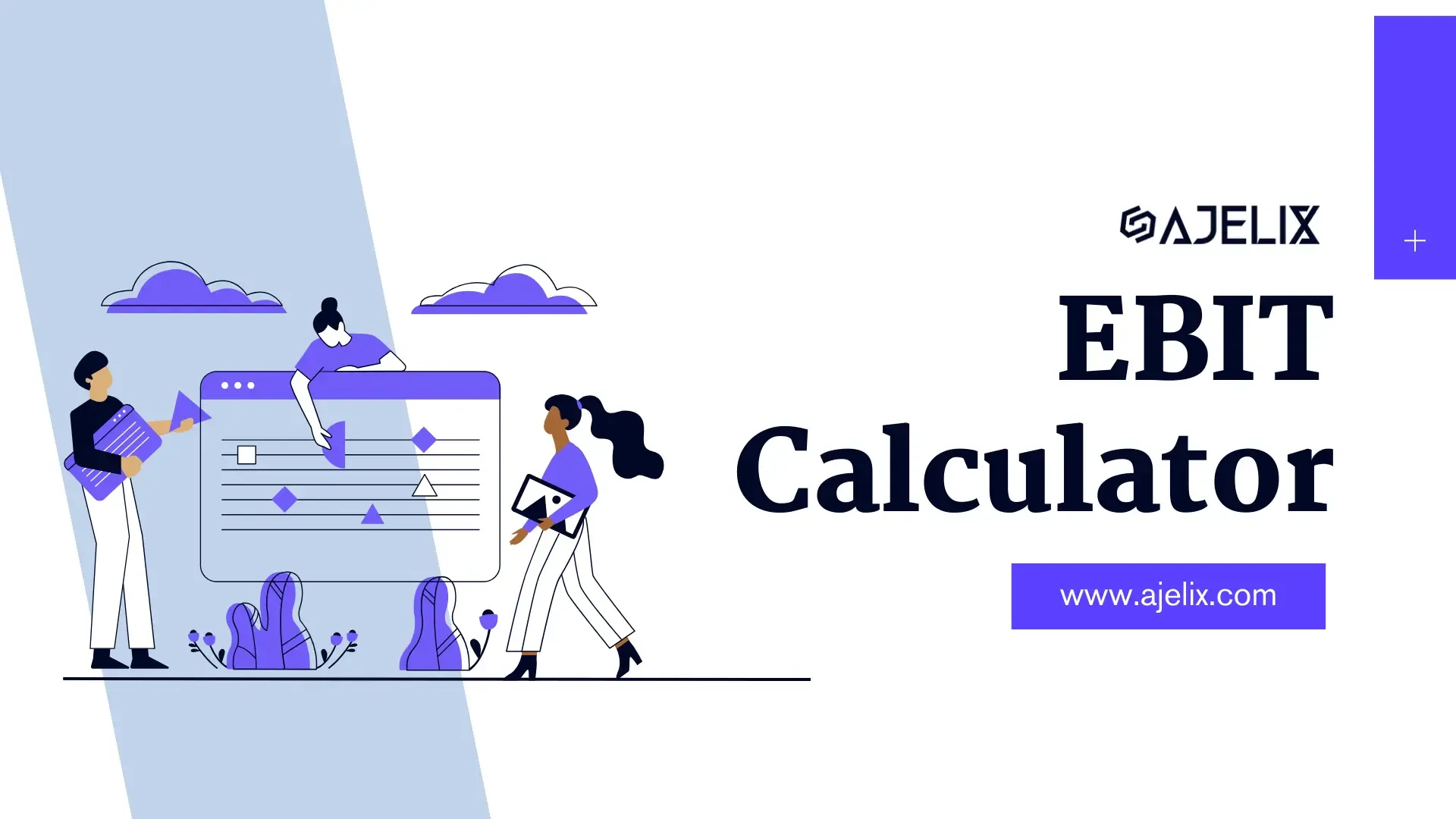- Home
- Product
- Tools
- AI Data Analyst
- Excel Formula Generator
- Excel Formula Explainer
- Google Apps Script Generator
- Excel VBA Script Explainer
- AI VBA Code Generator
- Excel VBA Code Optimizer
- Excel VBA Code Debugger
- Google Sheets Formula Generator
- Google Apps Script Explainer
- Google Sheets Formula Explainer
- Google Apps Script Optimizer
- Google Apps Script Debugger
- AI Excel Spreadsheet Generator
- AI Excel Assistant
- AI Graph Generator
- Pricing
Explore other articles
- GLM-5 is Now Available on Ajelix AI Chat
- AI Spreadsheet Generator: Excel Templates With AI Agents
- Excel Financial Modeling With AI Agents (No Formulas Need!)
- AI Landing Page Generator: From 0 To Stunning Page With Agent
- Creating Charts In Excel with Agentic AI – It Does Everything!
- Create Report From Google Sheets Data with Agentic AI
- How To Create Powerpoint Presentation Using AI Agent (+Video)
- Ajelix Launches Agentic AI Chat That Executes Business Workflows, Not Just Conversation
- 7 Productivity Tools and AI Plugins for Excel
- Julius AI Alternatives: Top 5 Choices 2026
Create dashboards fast & easy
The 21st century world is powered by data and its accuracy. One of the biggest challenges that organizations face is to analyze data and make it actionable. 📈
That’s where self-services business intelligence comes in handy. The main purpose of self-service analytics is the ability to access data, visualize, analyze and help you make data driven decisions. It should be relatively easy and shouldn’t require specific knowledge. Is that the reality? Let’s take a look.
In this article we will explain the basics of self-service BI, discover some BI tools for non-technical teams, review the benefits and disadvantages. We’ll explain the differences between standard BI platform and self-service BI and what you should keep in mind when choosing the data visualization tool.
Change the way you work with agentic AI
One-click dashboards,KPI tracking, and AI-powered insights—for work that actually gets done.
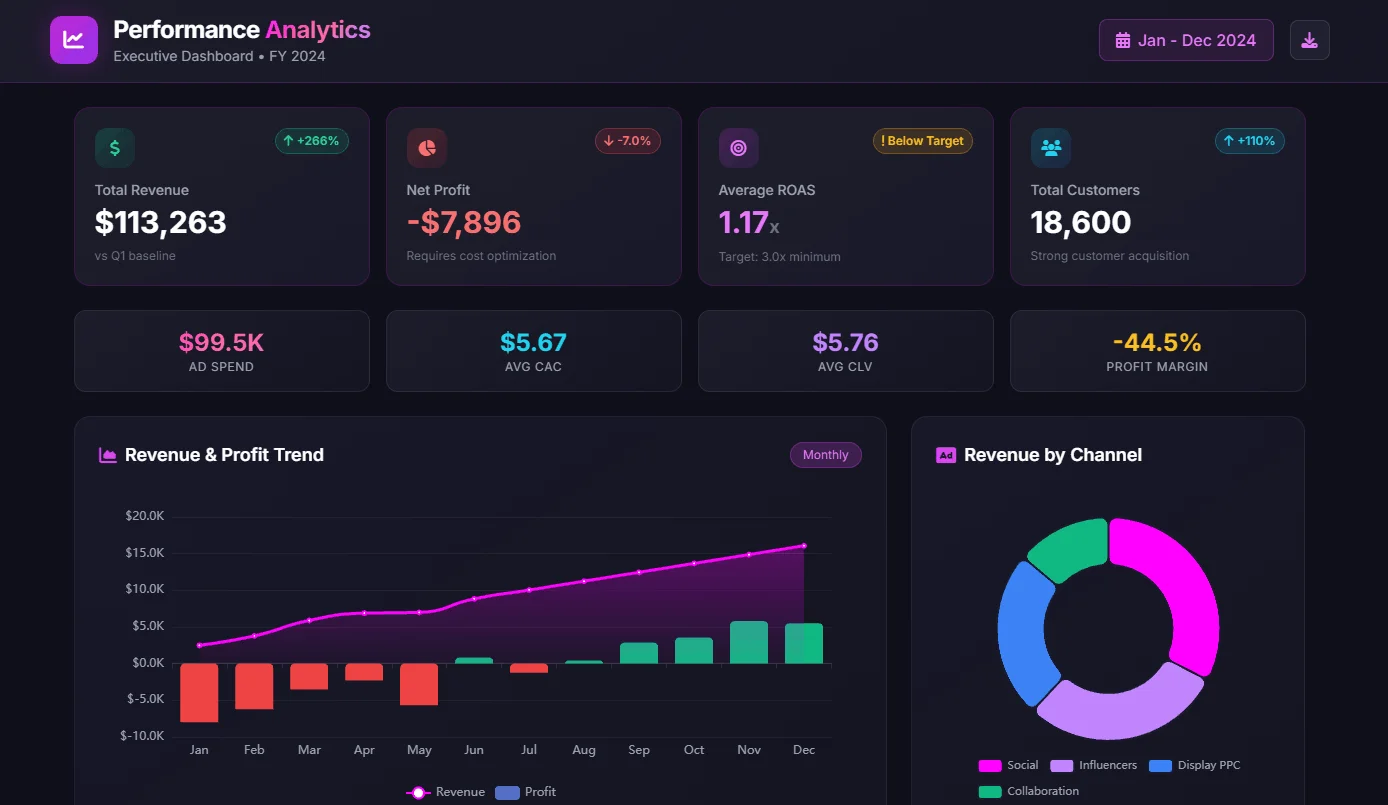
What is Self-service BI?
Self-service BI is a process in organization that let’s employees access, analyze, visualize the data without IT assistance. This process can empower business users to make data-driven decisions much faster.
What are the main features of self-service BI?
The main feature that any self-service platform should have is the ease of use. The platform has to be intuitive and shouldn’t require additional trainings. It should have dashboards, data connectors, visualization features, analytics capabilities and easy collaboration options.
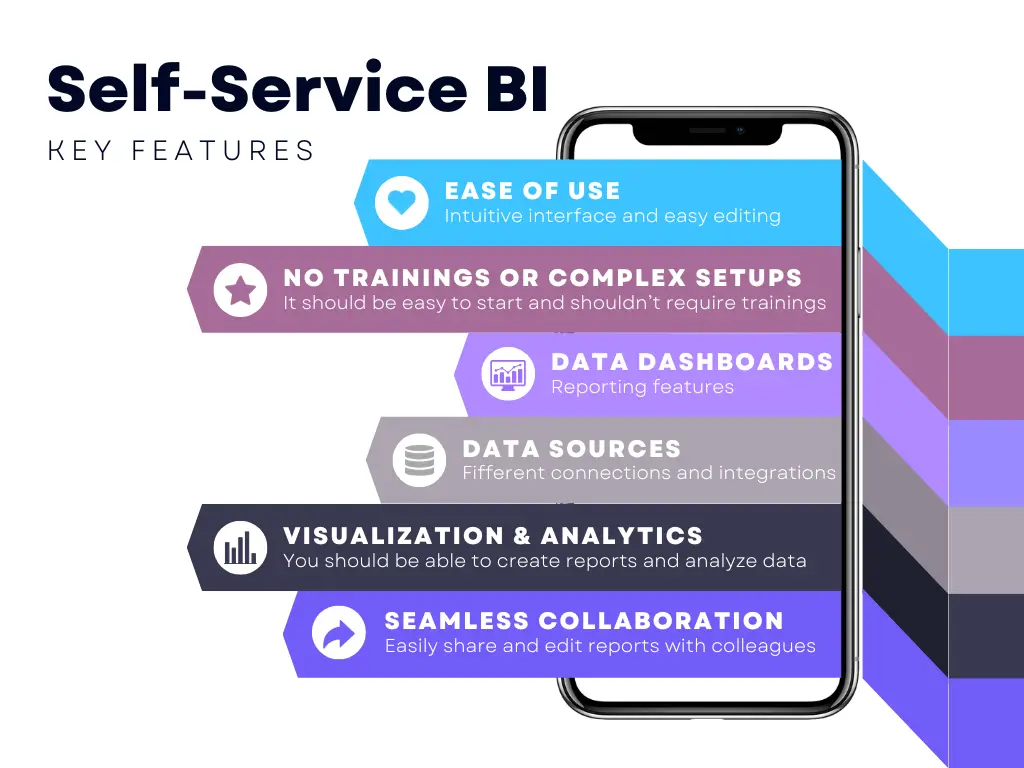
Self-service main features infographic by author
One of the examples is Ajelix BI. It was created to empower non-technical teams to help you get insights fast and painlessly. 💡
What are The Advantages of Self-Service BI?
Self-service platform benefits:
- Non technical users can access the reporting
- Improve decision making process in the organization
- Cost efficiency, as you remove the BI burden from IT team
1. Empower Non-Technical Users
One of the primary triumphs of Self-Service BI is its ability to empower individuals with diverse skill sets. From marketing analysts to finance professionals, the accessibility of insights transcends technical barriers, fostering a sense of ownership over data.
2. Accelerate Decision-Making Process
By placing the power of analysis directly into the hands of end-users, Self-Service BI expedites decision-making. Real-time data exploration facilitates swift responses to market changes, enabling organizations to stay agile in a dynamic business environment.
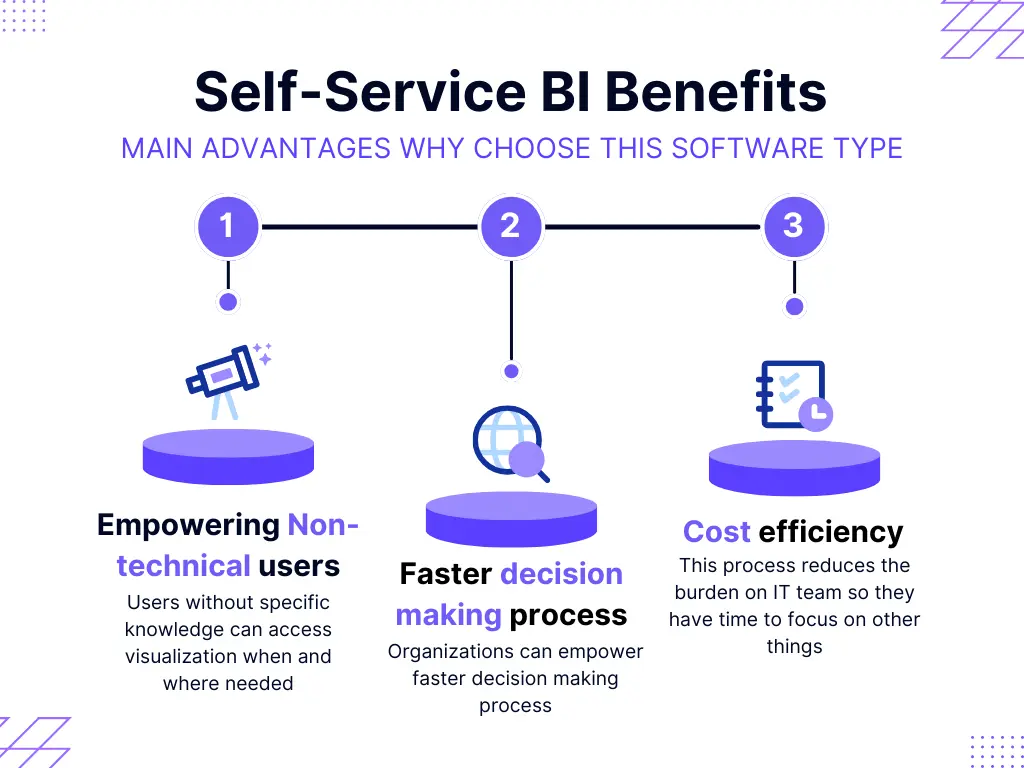
3. Save Costs and Time
Traditional BI models often involve lengthy processes of data requests and reports. Self-Service BI slashes these timelines, reducing the burden on IT departments and translating into cost savings. The streamlined approach allows businesses to pivot swiftly in response to emerging trends.
What’s The Difference Between Self-Service BI and Traditional BI?
1. User Accessibility and Flexibility
Unlike traditional BI models where data interpretation was confined to IT specialists, Self-Service BI opens the floodgates to a wider audience. End-users gain the flexibility to explore and draw insights independently, fostering a more collaborative decision-making environment.
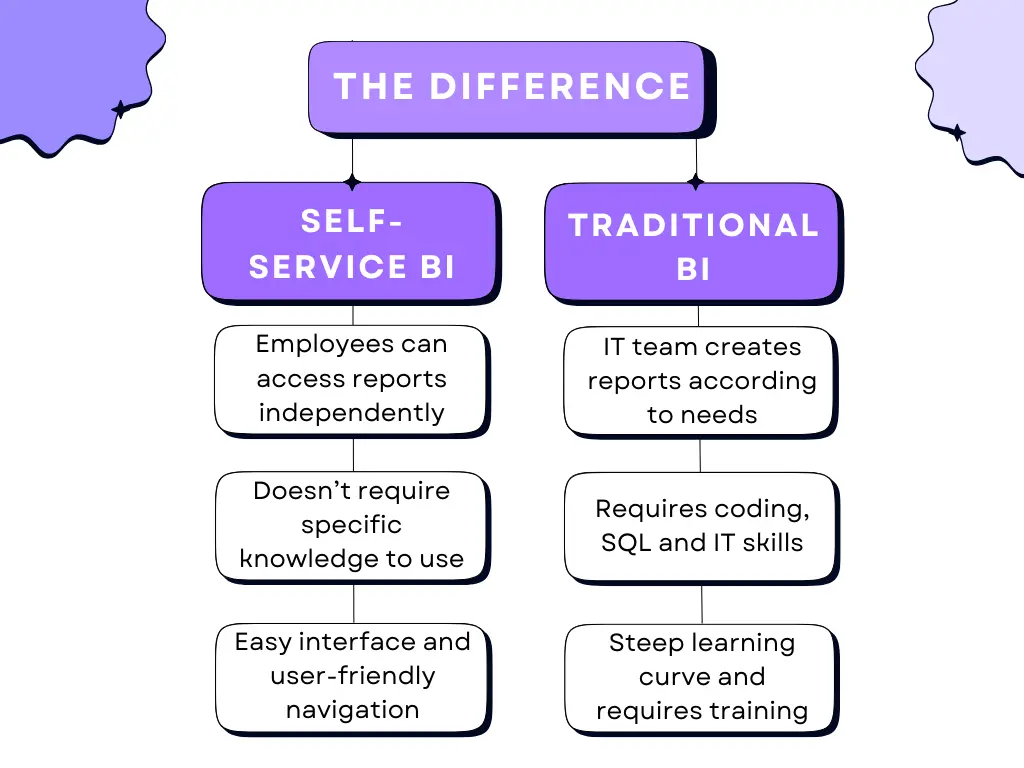
The difference between self-service BI and traditional BI platform infographic, made by author
2. Reducing Dependency on IT Departments
Historically, BI implementations were synonymous with extensive involvement from IT departments. Self-Service BI disrupts this paradigm, allowing business users to drive insights autonomously. This reduction in dependency streamlines processes and enhances overall efficiency.
What Are The Key Tools and Self-Service BI Platforms?
Top 10 Most Popular Self-Service BI Tools
A plethora of tools populates the Self-Service BI landscape. From Ajelix BI to Microsoft Power BI, each platform offers a unique set of features catering to different organizational needs.
- Ajelix BI
- Power BI
- Tableau
- Zoho Analytics
- Qlik Sense
- Looker (prev. Google Data Studio)
- Domo
- Databox
- Klipfolio
- Metabase
Compare Features and Capabilities
Before choosing the best BI tool for your needs, compare each platform to meet your needs. We have prepared several comparison articles, that will help you choose the most suitable software. You can follow our guide on best business intelligence tools comparison and review the tools outlined in this article. Or explore the best self-service BI tools.
How To Implement Self-Service BI in Your Business?
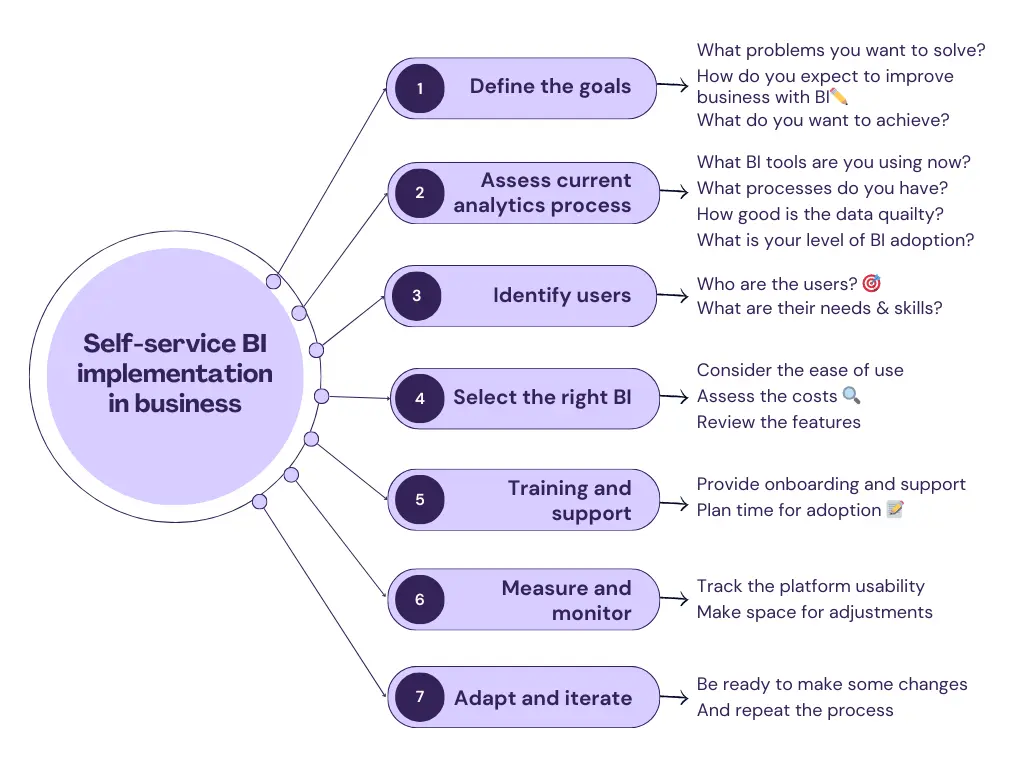
Infographic with steps to take to implement self-service BI business, made by author
Time needed: 1 day
Self-service BI implementation roadmap for organizations:
- Assess your current data analytics process
What BI tools and processes are you currently using? How good is the data quality? What is your level of business user adoption of BI?
- Identify the users
Who are the users who will be granted access to self-service BI? What are their data needs and skills?
- Select the right self-service BI platform
There are many self-service BI platforms available. Consider the ease of use, scalability, and integration with your existing data infrastructure.
- Develop a training and support plan
Users will need training to learn how to use the self-service BI platform or time to adopt to it. You should provide ongoing support to help them troubleshoot problems to get the most out of the platform.
- Measure and monitor usage
Track how your users are using the platform. This will help you identify areas where you can improve the platform or your training and support.
- Adapt and iterate
Self-service BI is not a one-time project. You will need to adapt and iterate the platform as your business needs change and your users become more experienced.
How Ajelix BI can help you?
So, you’ve learned about self-service business intelligence (BI) and how it can help your business make better decisions. Now, you’re probably wondering, “How does Ajelix BI fit into all of this?”
Ajelix BI is a self-service BI platform that is designed to make it easy for businesses of all sizes to access and analyze data. It is a user-friendly platform that is accessible to people without any prior experience with BI.
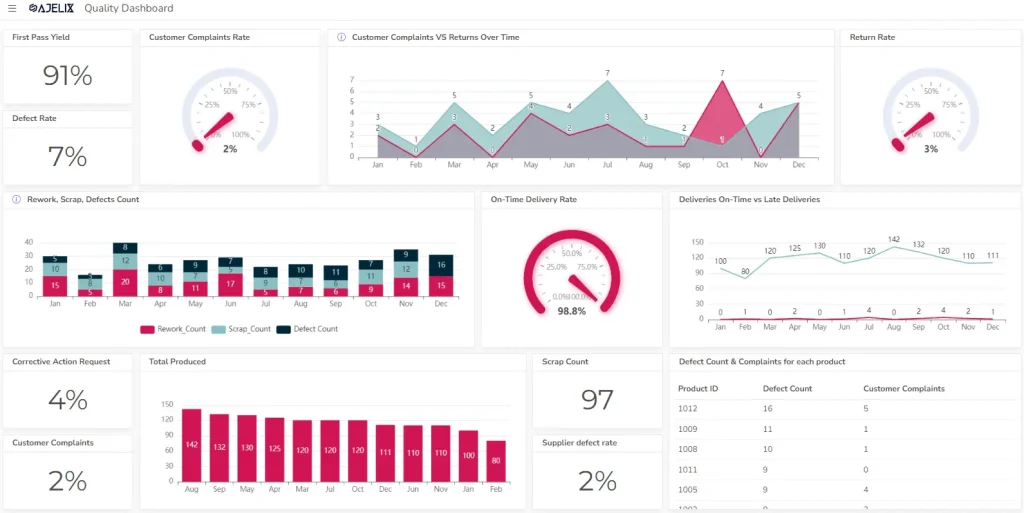
Ajelix BI dashboard example: View the live quality KPI dashboard
Here are just a few of the ways that Ajelix BI can help you:
- Create reports and dashboards: You can drag and drop data from your favorite sources, and with quick action help Ajelix BI will automatically create reports for you.
- Analyze your data: Analyze your data with AI analytics.
- Live data reporting: Connect your data with Google Sheets and get live insights.
- 1-click reports: Create reports using quick actions and get access to 1000’s of premade charts and reports.
- AI insights: Build your charts with AI using prompt engineering or analyze your data with AI.
- Share your insights: You can share your reports and dashboards using link or passwords.
- Get started for free: Ajelix BI offers a free plan that includes access the basic features.
So, if you’re looking for a self-service BI platform that is easy to use, powerful, and affordable, then Ajelix BI is the perfect solution for you. Get started today and start making better decisions with data.
Summary
In retrospect, Self-Service Business Intelligence is more than a technological leap; it’s a cultural shift. By encapsulating the evolution, advantages, challenges, and future trends, this article serves as a comprehensive guide for businesses considering the adoption of SSBI.
In embracing self-service, organizations not only empower their workforce but also position themselves at the forefront of the data-driven revolution.
FAQ’s
Self-service BI is a process in organization that let’s employees access, analyze, visualize the data without IT assistance.
Improved decision making, reduced IT costs and increased business user agility.
Self-service BI tools are Ajelix BI, Power BI, Zoho Analytics and Looker Studio.
Ready to get started with Ajelix BI?
From data to report in one minute or less with Ajelix BI
